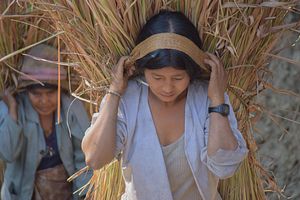Aung San Suu Kyi will have her hands full over the next few months as she seeks to lead two of Myanmar’s most important ministries. Unfortunately a woman at the head of two ministries does not two women ministers make. With Aung San Suu Kyi’s appointment as the only female minister, the number of women ministers has effectively been cut in half; there used to be two.
Now it is more important than ever to include women as true participants in governing Myanmar. The country is embarking on a new era of democracy, and this means amending and creating new laws and policies that will shape the rights and obligations of its citizens for years to come. If women’s voices are not part of this process, the outcome may further entrench the already deeply unequal status of women.
Take for instance the ever-complicated issue of land rights in Myanmar. The letter of the law in Myanmar is quite gender-neutral on issues related to land and property ownership, but the officials who apply it are almost all men. The government officials who engage most closely with communities on land issues are at the village tract and township levels. Yet only 42 out of 16,758 village tract administrators are women; and out of 330 townships in Myanmar there is not one female Township Administrator.
Why is this a problem? In every society, gender equality in decision-making is crucial to achieve policies that are sensitive to the different experiences and needs of men and women. While the mere physical presence of women in governance bodies does not ensure representation of women’s interests per se, it vastly improves the likelihood. Research by leading economists Esther Duflo and Raghabendra Chattopadhyay shows that in India the gender of government officials in specific positions affects the types of public goods they provide; namely, leaders invest more in issues directly relevant to the needs of their own genders.
The lack of women in Myanmar’s land governance to date may help explain, in addition to cultural norms, why even after the passage of several gender-neutral land laws in 2012, it has been overwhelmingly men who apply for the newly available land use certificates—the strongest form of land possession for farmers in the country.
According to Namati, a legal empowerment NGO which works on land rights issues in Myanmar, of the more than 2,000 clients the organization has assisted with land registration, 80 percent have been men. Only 16 percent have been individual women applicants – the other 4 percent represents joint registration by married couples. Joint registration is possible under Myanmar law but often unknown to both farmers and government alike. That all joint registration applications have been made with the assistance of women paralegals lends further credence to the idea that the gender of the people interfacing with communities on these issues affects who will benefit from the new laws and policies.
This is also true when it comes to government, military, and companies “releasing” or giving back land that was taken from communities under the previous military government. The Parliamentary Commission charged with investigating these cases reported on March 17, 2016 that 370,000 acres have been returned. In reality, the parceling of this released land is often left to communities to sort out among themselves, usually in accordance with historical tax documents that individuals hold. Once again, the majority of individuals holding these documents are men.
Implementation of Myanmar’s new National Land Use Policy, which passed in January 2016, provides one opportunity to start balancing the field. The government and civil society need to take seriously the provisions to fully include women in the many new land management bodies, as well as to ensure that women and men have equal rights in practice to own and manage land. The government should also specify that the return of grabbed land be done in a way that respects women’s land rights, for example, by educating individuals who receive released land that a spouse’s name can be added to a new land use certificate.
Stronger land use rights is great news in a country where 70 percent of the population depends on agriculture for livelihoods. But without a course correction soon, the current process will result in a formalized gender imbalance in legally-held land rights. This trend could have serious long-term consequences for women as legal rights and claims are increasingly enforced in a democratic Myanmar.
Caitlin Pierce is Namati’s Myanmar Program Officer. Namati is an international NGO dedicated to legal empowerment work, with a focus on land rights in Myanmar.
































